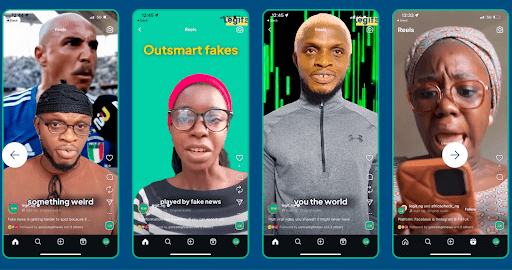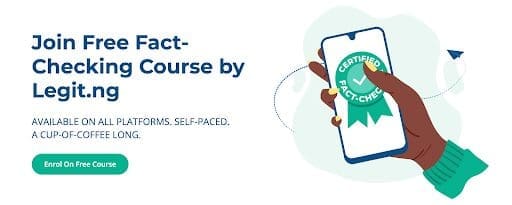Following the success of its initial media literacy campaign, Legit.ng, a top Nigerian digital media outlet, has launched a free, edutainment-style fact-checking course. The initiative is a direct response to research conducted by the team earlier this year.
It reveals a trend among Gen Z audiences across the continent (including South Africa): while their interest in politics and educational content can be unpredictable, they are consistently drawn to compelling human-interest stories and engaging entertainment.
By framing the course in an engaging, creative way, Legit.ng aims to hold the attention of young Africans while reminding them to be sharp about content accuracy. The campaign empowers young people to detect and challenge fakes on the platforms where they spread the fastest.
The course is running on key platforms like TikTok, Instagram, and Facebook, where young Africans often encounter misleading content. This initiative positions digitally savvy youth as powerful agents of truth and digital change rather than just consumers of content.
A vibrant coalition of youth-focused voices supports the campaign:
- Influencers and creators across Nigeria (Olawale Daniel, Faith Okochua, Luwizer Sunday, Akwaman) and Kenya (Trivah Njoki), are joining the movement, sharing bite-sized, engaging content with fact-checking tips tailored for their followers.
- Legit.ng has also partnered with leading African fact-checking organizations — Africa Check, an independent, non-partisan organization which assesses claims made in the public arena using journalistic skills and evidence, and DUBAWA, an independent transnational verification and fact-checking initiative of the Centre for Journalism Innovation and Development (CJID) working across West Africa to tackle information disorder and strengthen media literacy — to co-create expert-backed content that enhances media literacy with credible, easy-to-understand insights.
 Screenshot from the fact-checking course landing page
Screenshot from the fact-checking course landing page
“We’re not just telling people what misinformation is, we’re showing them how to spot it, verify it, and stop it from spreading,” said Rahaman Abiola, the Editor-in-Chief at Legit.ng. “By meeting our audience where they are — on TikTok or Instagram — we’re breaking down complex topics with an accessible, entertaining approach,” he added.
“For over a dozen years, we have worked at reducing the spread of misinformation through various means such as fact-checking, media training, and digital literacy campaigns,” David Ajikobi, Africa Check’s Nigeria Editor, said. “In the past few years, we have ramped up efforts towards building the capability of the public, especially young people, in spotting false information and verifying media content amid increasing use of AI in disinformation schemes,” he added.
The course is designed for everyone. It is entirely free to access on Legit.ng’s platforms and social media channels. Each lesson combines expert-backed content with relatable language, interactive elements, and real-life examples.
Legit.ng invites all media consumers, educators, creators, and changemakers to follow and engage with the campaign across its official social media pages, as well as those of its partners:
- @legit.ng (Instagram) and @legitngnews (TikTok)
- @africacheck (Instagram) and @africacheck_nigeria (TikTok)
- @dubawafacts (Instagram) and @dubawafacts (TikTok)
Together, we can create a more informed, resilient digital community, one post at a time.
